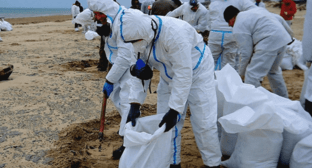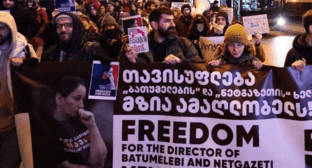06 July 2006, 20:12
Andrey Bachman: "Volgograd bureaus of medical-social examination are instruments of reviving eugenics"
"Recently, the bureaus of medical-social examination of Volgograd have transformed into an efficient instrument of eugenics that is reviving in Russia and is aggressively trying to penetrate the fundamental dogmata of state policy of Russia," Andrey Bachman, an activist of antifascist movement of Volgograd told in his interview to the correspondent of the "Caucasian Knot".
According to Andrey Valentinovich, "Putin's government has engaged the natural selection mechanisms: weak representatives of the society are dying out in the natural way, and strong "individuals" survive and bring forth, and the posterity is afterwards "washed out" of weak and miserable ones." "No doubt, we are witnessing first sparks of fascism that is born in our country. It is done under the shelter of socially-oriented phraseology and adoption of "correct" laws, which are either half-idling or do not work at all," Andrey Bachman said assessing the situation with Russian invalids.
Galina Slepukha, an invalid's wife and mother of two disabled kids told the correspondent that "in Volgograd the employees of MSEs (bureaus of medical-social examination - V. Ya.) are purposefully taking sick children off the disability status. They do everything possible to drop the total number of invalids in the Volgograd Region." "When waiting for my turn to appear before the commission, I saw absolutely injured people coming out of the doctor's office telling all in tears that they were taken off the disability status," Galina told, The doctors also told me with the joy they could hardly hide that my kids have nicely recovered and need no more state support."
The family of Galina and Igor Slepukhas has three sons. Two of them are invalids. Maxim of 15 suffers from implications of a heavy cranial trauma. He has a fracture of the cranial vault and basis, and a brain contusion. His spleen was amputated. At the present time, Maxim is suffering from everyday strong headache, nausea and nose bleeding. He was taught individually at home. Their younger son Ilya has undergone a complicated heart surgery. The husband suffers from diskal hernia. March 9, 2006, the Chief Bureau of MSE of the Volgograd Region spoke against extension of the disability status for Maxim Slepukha. According to experts, in a year Ilya will be refused disability status as well. Igor Evgenievich was also deprived of his disability status. Galina helplessly stretches out her hands, "How is it possible with the paid medicine to restore the health of the family? The state is rendering real help only to invalids. Other heavily sick patients beyond this status are turned adrift in the world."
Liudmila Petrovna Gichkun, deputy head for expertise work of the Federal State Institution "Chief Bureau of Medical-Social Examination for the Volgograd Region," told the correspondent that the number of people who approached their service has doubled since 2003. She attributes this fact to the "transition of the medicine to market rails." "During the days of free medicine in our country, all categories of patients were provided enough aid; therefore sick people could quite well solve their health problems without getting the disability status. At the present time however, the situation has changed: it is difficult to get expensive medications free of charge without being an official invalid. Patients have to approach us. And in certain cases we cannot set disability as patients fail to meet all the criteria under which disability is established."
There are three conditions under which disability status may be established, and according to Decree of the Government No. 95, dated 20.02.2006, the following three interrelated factors are the grounds for appointing the disability status:
1. A health disorder (disease) with a steady distress of organism functions caused by illnesses, trauma complications, or defects;
2. Restraint of vital activity (a complete or partial loss by a citizen of his or her capacity of self-service, to move independently, orient oneself, communicate, control one's behaviour, get trained or engaged into labour activity);
3. A need of social protection measures, including rehabilitation.
Only if all these three indicators are in place, the disability status is granted to a person. "Prior to make an expert's decision, we not only analyse medical documents, but make a personal examination of a patient and a social-dwelling examination of the patient's habitat: what are the dwelling conditions and subsistence level, - and only then, we make a decision. If the patient has a "border" status, we make a decision in favour of the patient," Liudmila Petrovna marked. According to her, "there is no reason to talk on any toughening of disability establishing process: complete rehabilitation is very low and does not exceed 5% per year lately. Meanwhile, the number of newly recognized invalids has grown up by about 45% during the last six years." "We are strictly abiding the law: if functional disorders do not restrain the vital activity of the patient, we have no right to award disability status," Liudmila Gichkun noted.
Nina Boldareva, children's rights commissioner for the Volgograd Region, said that adoption of a range of laws regulating social protection measures of the population is a positive factor, since the state continues to bear responsibility for these society layers at the federal level. At the same time, there is a trend to delegate this responsibility down to the regional authorities that impairs the effectiveness of social support of the population. "The imperfection of our legislation is also telling on the quality of this help. In respect of granting the disability status to sick children, we have a lot of questions to the law-makers: how, for instance, should we define "restraint of vital activity" in a child. There is one and the same criterion for children and adults. Although it is clear that they should differ. The employees of the MSE assert that their decisions are objective. And we state that they are not free of subjectivism. These problems should be solved. It is necessary to work on creating of the conditions, which will enable to form a more positive situation in the health care system of the country. It is especially important in the issues related to protection of children's rights," Nina Nickolayevna said.
Author: Vyacheslav Yashchenko, CK correspondent




